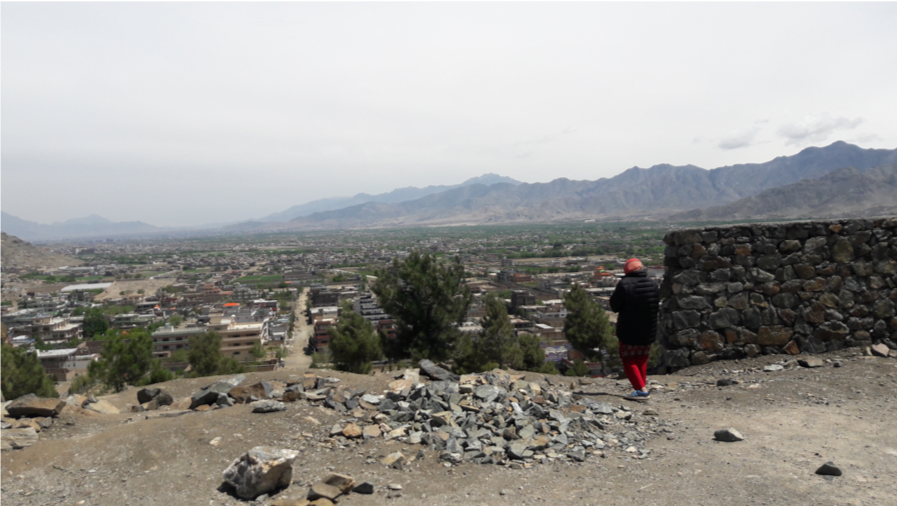Community-based Education in Urban Spaces: The Case of Kabul, Afghanistan
By Bibi-Zuhra Faizi. Photos provided courtesy of author.
Read the Farsi/Dari version here. Translated by Hameed Shaheer.
09 September 2020
Urbanization in the Global South
According to the United Nations, the world is experiencing the largest wave of urban expansion in history. More than half of the world’s population lives in urban spaces, and by 2050, it is projected that more two thirds of the world’s population will live in cities and towns—with Africa and Asia undergoing the most intense urban migrations.
Migration to cities is driven by varying factors across the Global South. Some individuals and families choose to migrate to cities for economic and educational opportunities, while many others are forced to urban centers due to conflict, and increasingly, climate change. This growth has already induced massive social, economic, and environmental transformations, raising concerns about increasing inequality. Paying particular attention to access to quality education is critical to mitigate these concerns.
As cities grow, education systems come under severe stress in an effort to absorb new students with differing educational experiences and attitudes. While the most obvious response seems to be to expand highly standardized formal education systems, another often overlooked pathway is complementary models, such as community-based education (CBE) that take into account local contexts.
Community-based Education in Kabul
Definitions of CBE differ across country settings, however, a common model that large international non-governmental organizations (NGO) support in the Global South through funding and teacher training involves local teachers, central locations based in homes and religious centers, and community participation in school oversight and management. CBE is well-positioned to meet the multifaceted challenges children face in settings of displacement and migration because it is locally situated in strong networks that connect families and local institutions.
My doctoral research focuses on CBE in the world’s fifth fastest growing city—Kabul, Afghanistan. Kabul has experienced large waves of both inward and outward migration during four decades of ongoing conflict. From 2001 to 2014, the population of Kabul ballooned from 1.5 million to 6 million. While in the past, CBE was primarily located in remote and rural areas removed from the central education system, CBE has been gradually and cautiously implemented in the nation’s capital to address capacity.
Promises of Community-based Education
Through seven months of ethnographic fieldwork that includes interviews with teachers, students, families, school council members, and NGO staff as well as observations of classrooms, teacher training, and school council meetings, my study highlights three factors that capture the success of CBE in urban spaces impacted by war and economic and political stressors—trust, belonging, and relationships.
Trust
Trust is key to opening access to and maintaining support of educational opportunities, especially in settings affected by conflict and displacement. Participants expressed trust in community-based schools (CBS) because of security and safety. Security typically involves physical well-being and is connected to external elements such as tanks, helicopters, and bombings, over which individuals have little control. Safety, on the other hand, is connected to behavior and attitudes that are deemed culturally appropriate. The central location of the CBS that I studied, within the neighborhood and next to the local mosque—the heart of the community—mitigated concerns about security. Meanwhile, the teachers’ religious authority and connections with families through the mosque and the local council provided students and families a sense of safety.
Belonging
Belonging concerns practices and dispositions within the classroom. Though teachers had differing ideas of what belonging meant, students and parents understand teachers’ shared attention to learning as well as character development as a form of care that made them feel they belonged. NGO training provides each teacher with specific tools and skills to engage all students in the learning process, while NGO supervision serves as an accountability mechanism for each teacher.
One mother’s comments emphasize the importance of attention to learning in the CBS, as she compares it to formal public schools:
“This school puts in more effort…We asked the children what they learned. The girls said we go to the board to solve questions. We become very happy. They tell us about their lessons. Some people tell their kids to go to school and they don’t ask about what they learned. But these girls tell us about what they learned.”
Relationships
Trust and belonging rely on strong and healthy relationships. One of the strengths of CBSs is having multi-level grades with students of varying academic and developmental stages, such that almost every child has a close family relative in the classroom. School in a new and unstable setting becomes less daunting with pre-established relationships between students and between teachers and families. Moreover, small classroom sizes enable practices that further solidify collaboration between teachers and relationships between students. For instance, teachers pair up older students with younger ones, enabling guidance for the younger students as well as confidence in older students.
CBSs are imagined and designed as temporary structures that lead to students enrolling in public schools. Yet, imagined progress does not often reflect complex realities. It is critical to recognize differential experiences with education and how CBSs can provide opportunities for children who may otherwise be out-of-school due to capacity constraints in overpopulated urban centers as well as concerns about security and safety that can be mitigated through the trust, belonging, and relationships that CBSs build.
Disclaimer: The views, thoughts, and opinions expressed in this publication belong solely to the author(s) and do not necessarily represent those of REACH or the Harvard Graduate School of Education.
About the Author
Bibi-Zuhra Faizi is an Ed.D. candidate in the Culture, Communities, and Education concentration at the Harvard Graduate School of Education. Her research examines the intersection of community and education in contexts of migration, displacement, and instability. In particular, she focuses on the opportunities that community-based schools and education provide for marginalized children in Afghanistan. Follow her on Twitter: @ZuhraFaizi.



